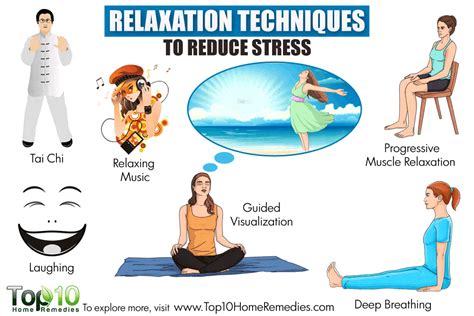Relaxation Techniques for Stress Relief and Inner Peace
Relaxation Techniques FAQ
What are relaxation techniques?
Relaxation techniques are practices to help bring about the body’s “relaxation response,” which is characterized by slower breathing, lower blood pressure, and a reduced heart rate. The relaxation response is the opposite of the stress response.
How do you evoke a relaxation response & reduce stress?
Following are six relaxation techniques that can help you evoke the relaxation response and reduce stress. 1. Breath focus . In this simple, powerful technique, you take long, slow, deep breaths (also known as abdominal or belly breathing). As you breathe, you gently disengage your mind from distracting thoughts and sensations.
How do you Relax Your Body?
The key to relaxing your body is to engage in activities that help induce the body's relaxation response. This can lead to a host of changes that help your body relax and also slow your heart rate, lower your blood pressure, reduce respiration rate, relax your muscles, improve glucose control, and boost your immunity.
Do you need a specific technique to relax?
You don’t need a specific technique to relax. You may respond better to incorporating relaxing activities into your routine, like taking a hot bath or reading a good book. Doing things you enjoy is just as good a way to relax and de-stress. And taking a moment to relax doesn’t require hours of your time.
What are relaxation skills?
Journal of Human Behavior in the Social Environment, 13 (3), 51-66. Relaxation skills are excellent tools for the treatment of stress, anxiety, and anger. In addition to being easy to use, relaxation techniques are some...
What are the different types of relaxation techniques?
Relaxation techniques generally involve focus and awareness. You focus your attention on something that is calming and raise awareness of your body. It doesn't matter which technique you use. What matters is that you find ways to relax to gain the benefits. Autogenic relaxation. Autogenic means something that comes from within you.
Do relaxation techniques really work?
There are some scientifically proven relaxation techniques that counter the stress response with what’s called—not surprisingly—the “relaxation response,” in which our bodies stop releasing stress hormones, our heart rate slows, our breathing deepens, and we begin to feel a sense of calm (what a relief!).
Relaxation Techniques References
If you want to know more about Relaxation Techniques, consider exploring links below:
What Is Relaxation Techniques
- https://www.mind.org.uk/information-support/tips-for-everyday-living/relaxation/relaxation-tips/
- https://www.mayoclinic.org/healthy-lifestyle/stress-management/in-depth/relaxation-technique/art-20045368
- https://www.verywellmind.com/how-to-relax-physically-and-emotionally-3144472
- https://www.health.harvard.edu/mind-and-mood/six-relaxation-techniques-to-reduce-stress
- https://psychcentral.com/lib/relaxation-make-time-and-take-time-for-self-care
- https://www.nccih.nih.gov/health/relaxation-techniques-what-you-need-to-know
- https://www.healthline.com/health/stress/how-to-relax
- https://www.berkeleywellbeing.com/relaxation.html
Explore Related Topics
The Impact of Aromatherapy on Diabetes Neuropathy: Fact or Fiction?
Examine the potential effects of aromatherapy on alleviating symptoms of diabetes neuropathy.
Essential Oils for Blood Sugar Balance: Myth or Reality?
Discuss the efficacy of essential oils in regulating blood sugar levels for individuals with diabetes.
